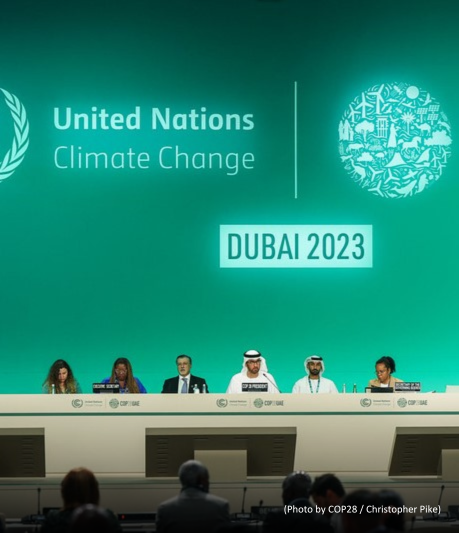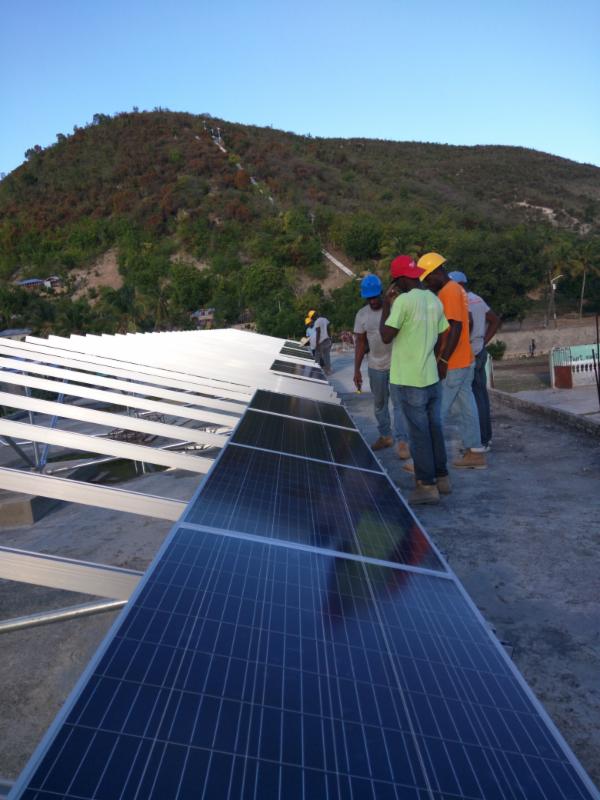Bob Freling is SELF’s Executive Director
Having just returned from the COP28 climate summit in Dubai, I am encouraged by the progress achieved but soberly aware of the many challenges that must still be addressed.
The meeting concluded with an agreement to transition away from fossil fuels in a “just, orderly and equitable manner.” This agreement, signed at the last minute by all parties to the conference, represents a historic occasion: It is the first time in almost three decades of climate negotiations that all nations in the world, large and small, have come together and unanimously committed to the transitioning away from fossil fuels as a necessary component to solving the climate crisis.
In addition, the pact signed in Dubai last week called for countries to triple their use of renewables by 2030, restrict emissions of methane (another potent greenhouse gas), and achieve net zero greenhouse gas emissions by 2050.
Noticeably absent from the agreement, however, were specific commitments to help developing nations finance their shift from away fossil fuels. Whether or not the world can reach its goal of tripling renewable energy use by 2030 will depend in large part on how much money can be made available to low-income countries to finance the large-scale deployment of solutions such as wind and solar. That question of financing for emerging economies has been left for future COP meetings and negotiations.

In the meantime, close to one billion people on the planet, mostly in rural parts of the global south, continue to be mired in energy poverty. Their lives and livelihoods are severely hampered by the lack of basic lighting at night, by their inability to access clean water, refrigerate vaccines, store food, generate income, or communicate with the wider world. Women bear the greatest burden when it comes to energy poverty, for they are typically the ones who must walk for miles everyday to fetch water, collect fuelwood, and cook over open fires. Roughly one million people die each year from waterborne diseases, and three million die annually from indoor air pollution.
Speaking at Bloomberg Green at COP28, a two-day side event in Dubai, former Vice-President Al Gore, when asked “if tackling climate change might be actually easier than trying to figure out how to fix democracy,” responded with the following comment:
“We hear this new word, polycrisis, so many different crises. I think that solving climate change is a polysolution. I honestly think that getting our collective act together in order to solve the climate crisis could be the same engine that pulls solutions for democracy, and capitalism, and the extinction crisis, because if we can reconstruct an ability to share a common base of accepted knowledge and reason together towards solutions for our crises, I think that is the pathway to restoration of sanity and self-governance.”

In a similar fashion, I believe that a collective pledge to eradicate energy poverty once and for all could be a catalyst to address not only climate change on a macro level, but also to solve some of the world’s most intractable problems faced by the global south: endemic poverty, lack of water and food security, poor healthcare, limited educational resources, and extreme vulnerability to climate related disasters.
That’s the amazing thing about UN Sustainable Development Goal (SDG) #7: affordable and clean energy. Delivering sustainable energy access to rural communities around the world can serve as a solid foundation for achieving all the other SDGs. It truly is a polysolution.
And because sunlight is universally available in every corner of the globe, whether you’re in a remote part of the Amazon rainforest, on a small island in the Pacific Ocean, or high up in the Himalayas, it is now increasingly feasible to harness that sunlight to deliver clean and carbon-free energy to meet a wide range of basic human needs.
While’s there’s certainly a lot more work to be carried out at future COP meetings—next year’s gathering will take place in Baku, the capital of Azerbaijan—we need not wait to start scaling clean energy solutions for the world. We have the tools at our disposal to make a difference now in the lives of hundreds of millions of people who can’t even turn on a lightbulb at night or pump fresh drinking water from a village well. The problem of energy poverty—from a technical standpoint—is largely solved. What we need now is the funding, political will, and collective dedication of governments, businesses, NGOs and communities to create a clean energy future that is accessible to all.

SELF is a global leader in the fight against energy poverty. Since 1990, we’ve pioneered unique applications for solar energy, powering progress on food security, health care, education, gender equity, and more.
501(c)(3) non-profit organization
EIN: 52-1701564